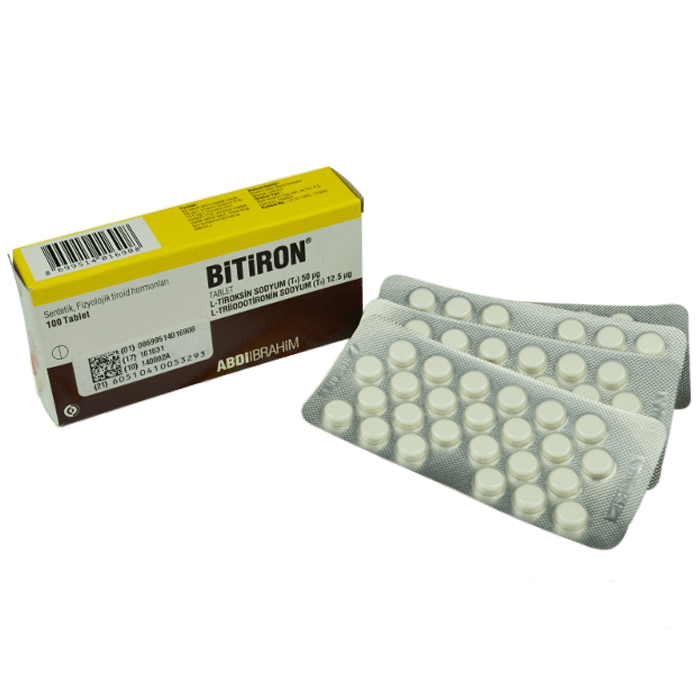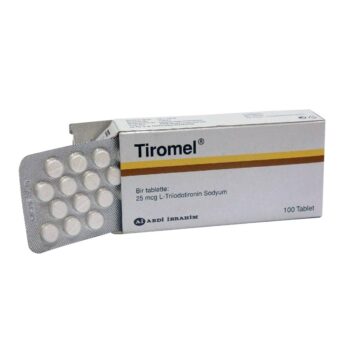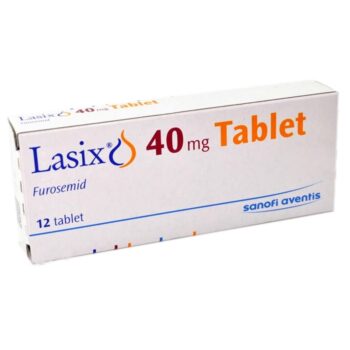Introduction
BITIRON Tablets are a pharmaceutical product specifically formulated to manage and treat thyroid-related disorders, including hypothyroidism. This condition occurs when the thyroid gland fails to produce sufficient amounts of thyroid hormones, leading to a range of symptoms that can significantly impact quality of life. BITIRON contains a combination of two active thyroid hormones: Levothyroxine Sodium (T4) and Liothyronine Sodium (T3). The dual-hormone approach provides a more comprehensive treatment option for patients who need both T4 and T3 to achieve optimal thyroid function.
What Are BITIRON Tablets?
BITIRON Tablets are a thyroid hormone replacement therapy designed to supplement the body’s natural hormone levels. Each tablet contains two active ingredients:
- Levothyroxine Sodium (T4): A synthetic form of thyroxine, which is the primary hormone produced by the thyroid gland. T4 is converted into the more active form, T3, in various tissues throughout the body.
- Liothyronine Sodium (T3): A synthetic form of triiodothyronine, the active thyroid hormone that exerts its effects on nearly every physiological process in the body, including metabolism, heart rate, and temperature regulation.
This combination allows for a balanced and effective restoration of thyroid hormone levels, addressing the needs of patients who may not achieve full symptom relief with T4 alone.
Indications
BITIRON Tablets are primarily indicated for the treatment of:
- Hypothyroidism: A condition characterized by an underactive thyroid gland, which results in insufficient production of thyroid hormones. Symptoms include fatigue, weight gain, cold intolerance, dry skin, hair loss, and depression. BITIRON helps to normalize hormone levels, alleviating these symptoms and restoring normal metabolic function.
- Secondary or Tertiary Hypothyroidism: Conditions where the thyroid gland is not directly affected, but there is a deficiency in the hormone signals (TSH or TRH) that regulate thyroid hormone production. These conditions can be due to pituitary or hypothalamic disorders.
- Subclinical Hypothyroidism: A mild form of hypothyroidism where blood tests show slightly elevated TSH levels, but T4 and T3 levels are still within normal range. BITIRON may be prescribed to help maintain optimal thyroid function and prevent progression to overt hypothyroidism.
- Myxedema Coma: A rare, life-threatening condition caused by severely low levels of thyroid hormones. It requires immediate medical attention, and BITIRON may be used as part of the treatment regimen under close medical supervision.
Mechanism of Action
BITIRON works by providing the body with synthetic forms of the thyroid hormones T4 and T3. The thyroid gland normally produces T4, which is converted into T3 in peripheral tissues. T3 is the more potent hormone and is responsible for most of the physiological effects associated with thyroid hormone activity.
- Levothyroxine Sodium (T4): Serves as a precursor to T3 and is converted into the active form in tissues throughout the body. It helps to stabilize hormone levels and provide a reservoir for T3 production.
- Liothyronine Sodium (T3): Provides immediate relief of symptoms due to its rapid onset of action. T3 directly interacts with thyroid hormone receptors in cells, influencing various metabolic processes, including basal metabolic rate, protein synthesis, and sensitivity to catecholamines (such as adrenaline).
The combination of T4 and T3 in BITIRON ensures a more physiological replacement therapy, closely mimicking the natural function of the thyroid gland.
Dosage and Administration
BITIRON Tablets are available in a strength of 50 mcg of Levothyroxine Sodium (T4) and 12.5 mcg of Liothyronine Sodium (T3) per tablet. The dosage should be individualized based on the patient’s clinical response, biochemical tests, and physician recommendations.
- Starting Dose: For most adults with hypothyroidism, the starting dose is typically one tablet taken orally once daily on an empty stomach, preferably 30 to 60 minutes before breakfast. The dose may be adjusted based on laboratory results and clinical response.
- Adjustments: Dosage adjustments are made gradually, usually every 4 to 6 weeks, based on TSH and T3 levels in the blood. It is crucial to follow the physician’s instructions closely to avoid over- or under-treatment.
- Pediatric Use: BITIRON can be used in pediatric patients with hypothyroidism, but the dosage must be carefully determined by a healthcare provider based on age, weight, and thyroid function tests.
- Elderly Patients: Elderly patients or those with cardiovascular disease should start with a lower dose to minimize the risk of adverse cardiac effects.
Contraindications
BITIRON Tablets are contraindicated in the following conditions:
- Untreated Thyrotoxicosis: An overactive thyroid condition where there is an excess of thyroid hormones in the bloodstream.
- Uncorrected Adrenal Insufficiency: Inadequate function of the adrenal glands must be addressed before initiating thyroid hormone therapy.
- Known Hypersensitivity: Any known allergy or hypersensitivity to Levothyroxine Sodium, Liothyronine Sodium, or any other components of BITIRON Tablets.
Warnings and Precautions
- Cardiovascular Disease: Patients with cardiovascular disease, particularly coronary artery disease, should be monitored closely as thyroid hormone therapy can increase the workload on the heart.
- Osteoporosis: Long-term use of thyroid hormones at high doses may contribute to decreased bone mineral density. Patients at risk of osteoporosis should be monitored regularly.
- Diabetes: Thyroid hormones can affect blood sugar levels. Patients with diabetes may need adjustments in their medication and should monitor blood glucose levels closely.
- Pregnancy and Breastfeeding: BITIRON is generally considered safe during pregnancy and breastfeeding, but dosage adjustments may be necessary. Pregnant women should have their thyroid function monitored regularly.
Side Effects
Common side effects of BITIRON Tablets, usually due to overtreatment, include:
- Palpitations or rapid heart rate
- Increased appetite
- Weight loss
- Nervousness or anxiety
- Tremors
- Insomnia
- Sweating
- Heat intolerance
These symptoms typically indicate that the dose is too high and needs to be adjusted by a healthcare provider.
Severe side effects are rare but can include chest pain, shortness of breath, or allergic reactions. Patients should seek immediate medical attention if they experience any severe symptoms.
Drug Interactions
BITIRON Tablets may interact with various medications and substances, potentially altering their effectiveness or increasing the risk of adverse effects. Some notable interactions include:
- Anticoagulants: Thyroid hormones can enhance the effects of blood-thinning medications, requiring dosage adjustments.
- Diabetes Medications: Thyroid hormones may affect blood sugar levels, necessitating changes in diabetes medication dosages.
- Calcium and Iron Supplements: These can interfere with the absorption of thyroid hormones. It is recommended to take them at least four hours apart from BITIRON.
- Cholesterol-Lowering Drugs: Certain cholesterol-lowering medications can bind to thyroid hormones and reduce their efficacy. Dosage timing and monitoring should be carefully managed.
Patients should inform their healthcare provider of all medications and supplements they are taking to avoid potential interactions.
Storage and Handling
BITIRON Tablets should be stored in a cool, dry place, away from direct sunlight and moisture. Keep the bottle tightly closed and out of reach of children. Do not use the medication beyond the expiration date indicated on the packaging.
Conclusion
BITIRON Tablets offer a dual-action thyroid hormone replacement therapy that can effectively manage hypothyroidism and related conditions. With its combination of Levothyroxine Sodium (T4) and Liothyronine Sodium (T3), BITIRON provides a comprehensive solution for patients who require both thyroid hormones to maintain optimal health and well-being. As with any medication, it is essential to use BITIRON under the guidance of a healthcare provider, adhere to the prescribed dosage, and monitor for any potential side effects or interactions. Regular follow-up with a healthcare professional will ensure that thyroid hormone levels remain within the desired range and that patients experience the full benefits of treatment.











Reviews
There are no reviews yet.